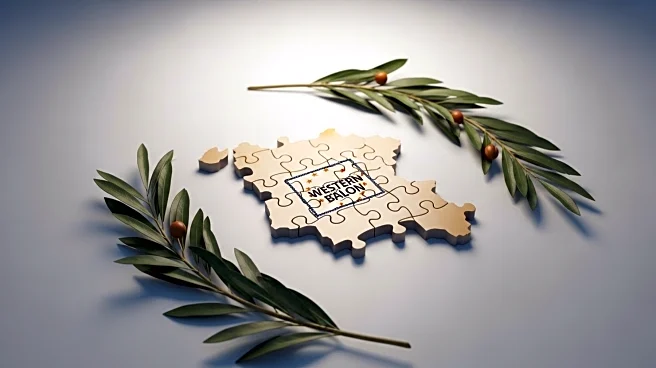What's Happening?
Leaders from the Western Balkan countries convened in Golem, Albania, to reaffirm their commitment to European Union integration. This annual gathering, part of the Brdo-Brijuni Process initiated by Slovenia and Croatia, aims to support EU enlargement in the region, which includes Albania, Bosnia, Serbia, Montenegro, North Macedonia, and Kosovo. The leaders issued a joint declaration emphasizing their shared vision for a peaceful, stable, and prosperous Europe. The meeting highlighted the varying stages of EU membership among these countries, with Montenegro and Albania leading, while Serbia, Bosnia, Kosovo, and North Macedonia are further behind. The EU's willingness to accept new members has increased since the onset of the Ukraine war, raising concerns about potential spillover into the Balkans, a region still affected by past conflicts.
Why It's Important?
The reaffirmation of EU integration by Western Balkan leaders is significant as it underscores the region's strategic importance in European stability and security. The ongoing war in Ukraine and Russia's confrontation with the West have heightened the urgency for EU expansion to include the Balkans, potentially mitigating regional tensions and fostering economic growth. The EU's 6 billion euro growth plan aims to advance reforms, but leaders like Slovenian President Natasa Pirc Musar have urged Brussels to expedite the process, highlighting the stakes for security and peace in Europe. Successful integration could lead to increased political stability and economic development, benefiting both the Balkans and the EU.
What's Next?
The Western Balkan countries will continue to work on reforms necessary for EU membership, with Montenegro and Albania likely to progress faster than others. The EU's response to the region's integration efforts will be crucial, as accelerated membership processes could stabilize the Balkans and prevent potential conflicts. The Brdo-Brijuni Process will continue to facilitate political dialogue and reconciliation, addressing lingering tensions, particularly between Serbia and Kosovo. The EU's strategic decisions regarding enlargement will play a pivotal role in shaping the future of the region.
Beyond the Headlines
The Brdo-Brijuni Process not only focuses on EU integration but also aims to promote reconciliation after the 1990s wars. This initiative is symbolic of diplomacy and peace-building efforts, crucial for long-term stability in the Balkans. The process highlights the importance of addressing historical grievances and fostering cooperation among countries with complex pasts. As the region moves towards EU membership, these diplomatic efforts will be essential in ensuring sustainable peace and development.









